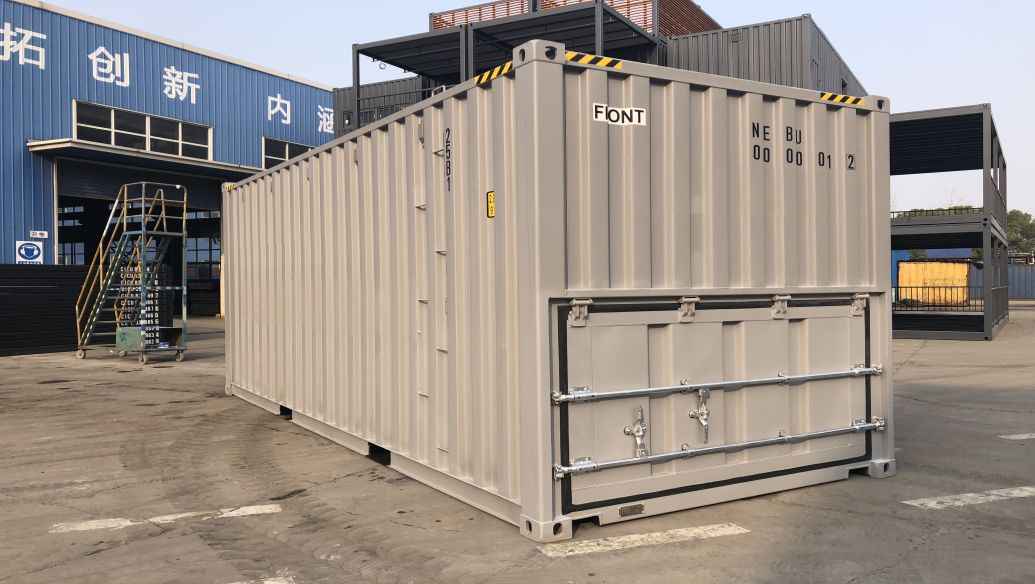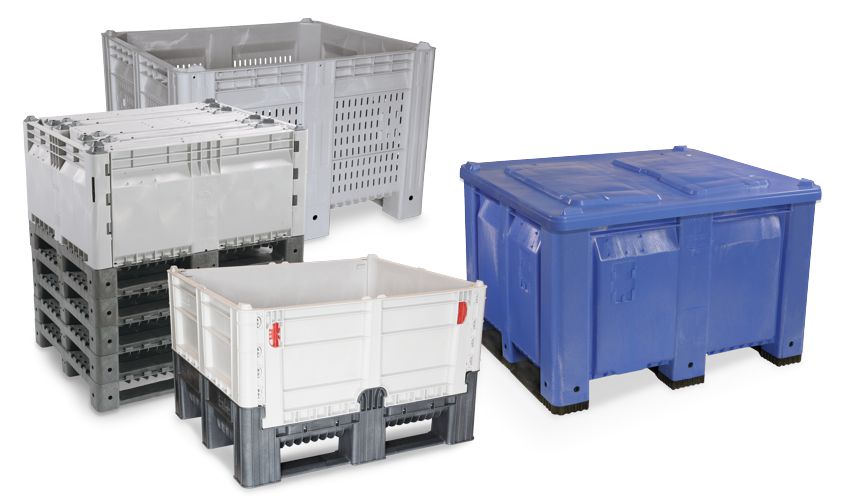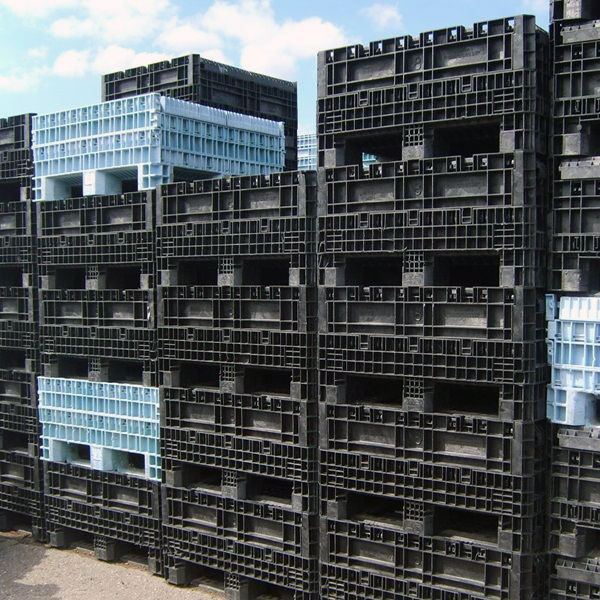Why Mass Containers Are Vital for Lasting and Cost-Effective Transportation
Bulk containers play a crucial role in contemporary logistics. They facilitate the efficient movement of large quantities of products, thus optimizing transport procedures. This technique not only reduces prices yet likewise minimizes ecological effect with lower emissions and waste generation. As sectors look for even more sustainable practices, the fostering of bulk containers is becoming significantly substantial. What effects does this change hold for future logistics and supply chain administration?

The Advantages of Using Bulk Containers in Logistics
Mass containers transform logistics by improving performance and sustainability. These containers enable the transport of huge quantities of products in a single journey, considerably minimizing the number of trips needed. This not just improves operations however also lessens labor prices connected with handling, loading, and dumping. On top of that, mass containers are created to maximize room utilization within transport lorries, making certain that even more products can be delivered all at once.
The standardization of mass containers additionally streamlines the logistics procedure. With consistent dimensions, they can be quickly piled and kept, leading to improved warehouse management. Mass containers commonly include durable products that shield components from damages during transportation, thereby decreasing product loss and enhancing total dependability. Therefore, services can experience boosted supply chain efficiency, eventually bring about raised productivity and client satisfaction. This combination of factors makes mass containers a vital asset in modern-day logistics.
Environmental Effect: Decreasing Waste and Carbon Footprint
As sectors increasingly focus on sustainability, the adoption of bulk containers has actually become a vital method for reducing waste and reducing carbon impacts. These containers reduce making use of packaging products, such as boxes and plastic, thus especially decreasing general waste generation. By combining deliveries, bulk containers boost transportation effectiveness, allowing for even more items to be moved per trip. This decrease in journeys straight correlates with lower greenhouse gas exhausts, contributing to a smaller carbon footprint.
Moreover, bulk containers can commonly be recycled or recycled, even more alleviating ecological effect. The resilience of these containers guarantees they can endure several transport cycles, minimizing the requirement for single-use choices. used plastic containers. By streamlining logistics and promoting reliable resource use, bulk containers not only sustain lasting techniques yet additionally urge sectors to line up with worldwide environmental objectives. Inevitably, their application mirrors a commitment to environmental stewardship and accountable source management
Price Cost Savings: How Mass Containers Lower Transport Costs
While lots of firms look for means to boost their profits, the usage of mass containers presents a significant chance for reducing transportation expenses. Mass containers optimize the volume of goods transferred, allowing companies to deliver larger amounts simultaneously. This effectiveness lowers the number of journeys called for, directly decreasing gas expenses and lessening labor costs connected with loading and discharging.
Additionally, bulk containers usually include streamlined layouts that maximize area usage within transport lorries. This means less voids, leading to extra efficient use offered capability. Additionally, the longevity of mass containers can decrease the threat of product damages throughout transit, ensuring and minimizing losses that more products get here intact.
Enhancing Supply Chain Performance With Bulk Storage Solutions
Bulk storage space solutions play an important function in improving supply chain effectiveness by enhancing stock administration. By settling items into fewer, bigger containers, businesses can considerably lower managing prices connected with regular transfers and handling. This structured approach enables far better monitoring and administration of inventory, eventually causing enhanced functional efficiency.
Structured Supply Management
Reliable supply monitoring is necessary for maximizing supply chain procedures, particularly when companies take on bulk storage space options. These remedies make it possible for organizations to keep greater stock levels while reducing the frequency of replenishment. By settling products into bulk containers, companies can streamline their inventory procedures, lowering the intricacy related to tracking numerous smaller sized bundles. This strategy promotes exact stock counts and boosts forecasting accuracy, permitting even more informed decision-making. On top of that, bulk storage remedies streamline warehouse company, making it less complicated to find and access items when required. Consequently, companies can attain a much more efficient supply turnover price, eventually enhancing total supply chain performance and reducing the probability of stockouts or overstock scenarios.

Reduced Handling Prices
The implementation of bulk storage space services not just simplifies inventory administration yet also significantly lowers handling costs across the supply chain. By settling products into bulk containers, business decrease the need for frequent handling and transfer between different storage space and transport units. This approach reduces labor costs linked with loading, dumping, and moving smaller bundles. Furthermore, mass storage space decreases the frequency of shipments, resulting in reduced transportation costs and decreased gas intake. As a result, services can enhance their logistics operations, permitting an extra reliable appropriation of sources. Inevitably, minimized taking care of costs add to boosted overall supply chain efficiency, cultivating a setting that sustains both sustainability and financial stability.

Convenience of Mass Containers Across Numerous Industries
Lots of sectors have distinct demands for transport and storage space, bulk containers have arised as a functional solution that meets a large array of demands. These containers, varying from large bins to specialized storage tanks, can fit diverse materials, consisting of granules, powders, and liquids. In the agricultural industry, bulk containers facilitate the transport of grains and plant foods, while the food and drink industry utilizes them for components and completed items. The chemical market counts on mass containers for securely transporting hazardous materials, guaranteeing compliance with security guidelines. Additionally, building and construction firms gain from bulk containers for moving aggregates and various other products. Their flexibility expands to numerous settings of transportation, including trains, ships, and trucks, enhancing logistical efficiency. This versatility not just enhances operations throughout various markets however likewise promotes sustainability by lowering product packaging waste and enhancing space in transit. Bulk containers play a necessary duty in contemporary supply chain management.
Future Fads in Bulk Container Use and Sustainability
The future of mass container usage is increasingly shaped by innovative products growth that enhances sustainability. Furthermore, automation in logistics assures to streamline procedures, lowering waste and boosting performance. Welcoming round economic situation practices will additionally reinvent exactly how bulk containers are created, made use of, and reused, promoting an extra sustainable transportation landscape.
Cutting-edge Products Development
As markets increasingly prioritize sustainability, ingenious materials advancement wholesale containers arises as a considerable variable in enhancing eco-friendly transport solutions. Manufacturers and researchers are checking out eco-friendly plastics, recycled composites, and lightweight metals to decrease environmental effect. These products not just minimize waste but also improve fuel effectiveness by decreasing the total weight of containers. Furthermore, developments in smart materials, which can adapt to differing conditions, improve the durability and performance of mass containers. The assimilation of these cutting-edge materials aligns with circular economic situation concepts, advertising reuse and recycling. As the need for sustainable practices grows, the growth of such products will certainly play a crucial function fit the future of bulk container usage in logistics and transportation.
Automation in Logistics
Significant developments in automation are poised to change logistics and the application of bulk containers, enhancing sustainability in transportation. Automated systems, including drones and autonomous cars, are streamlining the movement of bulk containers, reducing the dependence on standard fuel-powered transportation. These technologies optimize routing and filling processes, reducing vacant miles and enhancing gas performance. Furthermore, automated stock administration systems enhance tracking and surveillance of mass containers, making sure much better resource allocation and lowered waste. The assimilation of the Web of Things (IoT) permits real-time information analysis, enabling proactive decision-making that aligns with sustainability objectives. As automation remains to progress, it is expected to drive better technologies wholesale container usage, inevitably sustaining more sustainable logistics methods and lowering the ecological effect of transport.
Round Economic Situation Practices
Improvements in automation are establishing the stage for a more incorporated strategy to circular economic climate methods in the domain name of mass container use. As markets progressively embrace sustainability, mass containers are being designed for longevity and reusability. This shift not only refurbished bulk containers minimizes waste yet additionally boosts resource performance. Business are adopting approaches such as closed-loop systems, where utilized containers are accumulated, reconditioned, and reestablished right into the supply chain. Additionally, wise innovations track container life cycles, helping with far better monitoring and minimizing environmental influence. The cooperation in between producers, logistics carriers, and end-users is vital in developing criteria for sustainable container use. used plastic containers. Future fads indicate an expanding focus on products that are biodegradable and recyclable, further reinforcing the circular economy's principles in bulk transportation

Often Asked Questions
What Products Are Mass Containers Normally Made From?
Mass containers are typically constructed from long lasting materials such as high-density polyethylene, steel, light weight aluminum, and cardboard. These products offer defense, stamina, and convenience, making them appropriate for transporting different items in different markets successfully.
How Do I Pick the Right Size Bulk Container?
Choosing the right size bulk container entails assessing the volume of materials to be carried, thinking about managing tools compatibility, and evaluating storage room needs. Appropriate dimension assurances effectiveness in transport and reduces waste during delivery.
Are Mass Containers Reusable or Recyclable?
Bulk containers are commonly recyclable, developed for multiple journeys, boosting sustainability. Lots of can additionally be reused, depending upon the materials used. Choosing recyclable options even more supports environmental goals and minimizes waste in transportation methods.
What Safety And Security Rules Relate To Mass Container Transport?
Security guidelines for mass container transport include compliance with the Department of Transportation standards, correct labeling of unsafe materials, architectural honesty analyses, and adherence to weight restrictions to ensure risk-free handling and avoid accidents throughout transit.
Exactly How Can Companies Change to Utilizing Mass Containers Successfully?
Companies can change to bulk containers by evaluating present logistics, educating team on handling, buying ideal devices, optimizing inventory administration, and teaming up with distributors to assure compatibility and efficiency throughout the supply chain.
As markets significantly prioritize sustainability, the adoption of bulk containers has arised as a key approach for reducing waste and lowering carbon footprints. By combining materials into mass containers, business can streamline their inventory procedures, decreasing the complexity connected with tracking numerous smaller packages. As industries increasingly prioritize sustainability, cutting-edge products development in bulk containers emerges as a significant element in boosting environmentally friendly transportation remedies. Automated systems, including drones and autonomous vehicles, are streamlining the motion of bulk containers, decreasing the dependence on traditional fuel-powered transportation. Additionally, automated inventory management systems enhance monitoring and monitoring of mass containers, ensuring much better source allocation and decreased waste.